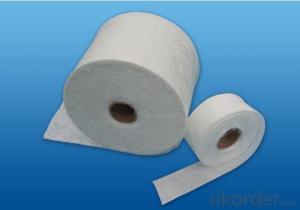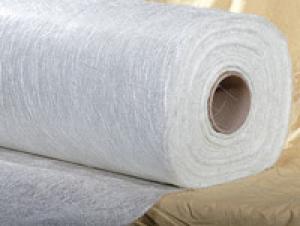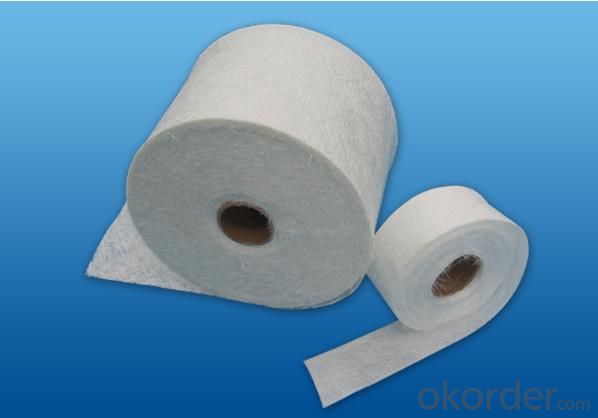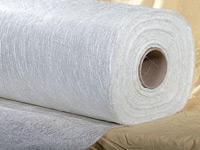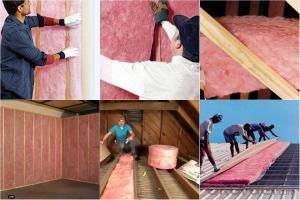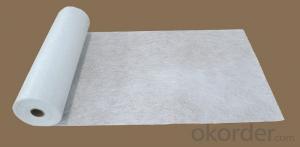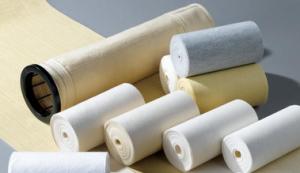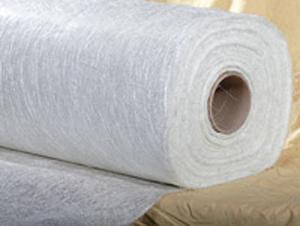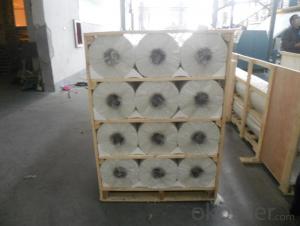Fiberglass Mat Tissue Stitched Mat 250g
OKorder Service Pledge
OKorder Financial Service
You Might Also Like
Structure of FIBERGLASS STITCHED MAT
The stitched mat is made of chopped strand which randomly dispersed and be stitched together by polyester thread. The width is available from 150-2400mm.Density of mat generally is 300-600g/m2.
The product is compatible with Polyester resin, vinyl ester resin, and epoxy resin.
Stitched mat is mostly primarily in pultrusion, RTM, filament winding, compression molding and hand lay up processes.
It is widely used in pipe lining, pultrusion section, storage tanks, FRP boat, insulation panel etc.
Main Features of FIBERGLASS STITCHED MAT
◎ Uniform thickness, good wet tensile strength retention.
◎ Good mould-ability, good drapability and easy operation.
◎ Good wet out speed and high efficiency in production.
FIBERGLASS STITCHED MAT Images
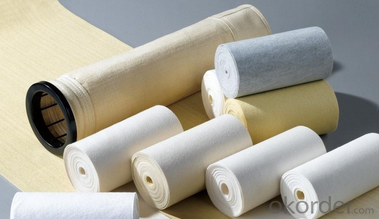
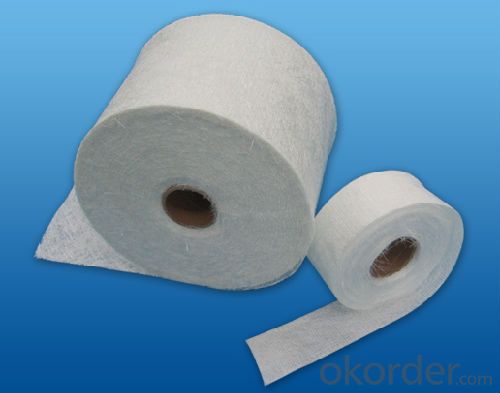
FIBERGLASS STITCHED MAT Specification:
Code | Density(g/m2) | Chopping layer density g/m2 | Width mm |
EMK225 | 225 | 225 | 150~2600 |
EMK250 | 250 | 250 | 150~2600 |
EMK300 | 300 | 300 | 150~2600 |
EMK450 | 450 | 450 | 150~2600 |
EMK600 | 600 | 600 | 150~2600 |
FAQ of FIBERGLASS STITCHED MAT
1. Why Choose us?
CNBM is a stated own company, provide the guarantee for the best quality, best service and safety business.
2. How will we guarantee the quality?
a, ISO 9001-2008 quality control system;
b, Strict and regular quality control in production;
c, Inspeciation when loading into container before shippment;
d, Sample stock for one year for quality tracing and record.
3. What is your MOQ?
Our MOQ is one pallet.
4. Can you provide sample?
Yes, samples are in stock. we can offer free sample for you.
5. Payment terms?
We can accept L/C, T/T etc.
6. Do you offer OEM service?
Yes, we can print customers’ logo on the packaging;
And the size and specification can be produced and design according to your demand.
- Q: Can fiberglass mat tissue be used for flooring insulation?
- No, fiberglass mat tissue is not typically used for flooring insulation. Fiberglass mat tissue is a lightweight material often used in the construction industry for applications such as reinforcing plaster and concrete, as well as for insulation in walls and ceilings. However, when it comes to flooring insulation, other materials such as foam boards or batt insulation are more commonly used. These materials provide better thermal and sound insulation properties specifically designed for flooring applications. Additionally, foam boards and batt insulation are easier to install and are better suited to withstand the pressures and demands of foot traffic on the flooring.
- Q: Is fiberglass mat tissue suitable for wastewater treatment applications?
- Yes, fiberglass mat tissue is suitable for wastewater treatment applications. It is commonly used in the construction of wastewater treatment tanks and pipes due to its corrosion resistance, durability, and ability to withstand harsh chemical environments. Additionally, fiberglass mat tissue is non-reactive to biological and chemical elements present in wastewater, making it an ideal material for such applications.
- Q: What is fiberglass mat tissue?
- Fiberglass mat tissue, made from randomly oriented glass fibers bonded together with a binder, is a non-woven material used in construction, automotive, and aerospace industries. The primary function of fiberglass mat tissue is to reinforce and provide strength and durability to composite materials. It acts as a supportive layer between the glass fibers and resin, distributing stress and improving mechanical properties. Fiberglass mat tissue offers several advantages. It is lightweight, flexible, and easy to handle, making it suitable for complex shapes and curved surfaces. It also has excellent resistance to chemicals, moisture, and temperature changes, ensuring longevity in harsh environments. In construction, fiberglass mat tissue is commonly used in roofing materials, wall panels, and insulation boards. Its high strength-to-weight ratio makes it ideal for reinforcing concrete structures like bridges and buildings. In the automotive industry, fiberglass mat tissue enhances the structural integrity of car parts such as body panels, bumpers, and interior components, making them more resistant to impacts and vibrations. In aerospace, fiberglass mat tissue is utilized in the production of aircraft components like wings, fuselages, and interiors. Its lightweight nature contributes to fuel efficiency and weight reduction while maintaining necessary strength for safe flight. Overall, fiberglass mat tissue is a versatile and reliable material that plays a crucial role in enhancing the performance, durability, and safety of various products across industries. Its unique properties make it an indispensable component in the production of composite materials.
- Q: What is the expected lifespan of fiberglass mat tissue in underground applications?
- The expected lifespan of fiberglass mat tissue in underground applications can vary depending on various factors such as the specific conditions, environmental factors, and maintenance practices. However, on average, fiberglass mat tissue used in underground applications can have a lifespan ranging from 25 to 50 years.
- Q: Is fiberglass mat tissue suitable for chemical storage tanks?
- Fiberglass mat tissue is generally considered suitable for chemical storage tanks. Fiberglass itself is known for its excellent chemical resistance properties, making it a popular choice for storing a wide range of chemicals. Additionally, fiberglass mat tissue is typically used as a reinforcement layer in the construction of fiberglass tanks, providing added strength and durability. However, it is important to note that the specific chemical being stored must be taken into consideration. Some highly corrosive or reactive chemicals may require more specialized materials or additional protective coatings to ensure the integrity of the storage tank. Therefore, it is always recommended to consult with a professional engineer or manufacturer to determine the most suitable materials for a specific chemical storage application.
- Q: Can fiberglass mat tissue be used for repairing fiberglass fenders?
- Fiberglass fenders can be repaired using fiberglass mat tissue. This versatile material is commonly employed in fiberglass repair tasks, serving as a reinforcement layer to enhance strength and durability in the repaired region. To mend damaged or cracked areas of fiberglass fenders, one can apply a resin layer and then lay the fiberglass mat tissue on top. By saturating the mat tissue with additional resin, a strong bond is formed, ensuring a smooth finish. This restorative process not only revitalizes the fender's structural integrity but also delivers a seamless repair. It is worth noting, however, that the extent of the damage and the expertise of the repairer ultimately determine the success of the repair.
- Q: Can fiberglass mat tissue be used for insulating crawl spaces?
- Indeed, one can utilize fiberglass mat tissue to insulate crawl spaces. This material, widely employed for insulation objectives, proves to be versatile. It boasts a lightweight composition that enables flexibility and easy installation, rendering it appropriate for crawl spaces that typically present restricted access and cramped corners. Moreover, fiberglass mat tissue showcases resistance against moisture, mold, and pests, making it an optimal selection for crawl spaces that frequently encounter these complications. Adding to its appeal, it exhibits exceptional thermal insulation properties, thereby promoting steady temperature maintenance and energy efficiency within the crawl space. All in all, fiberglass mat tissue proves itself to be a dependable and efficient choice for crawl space insulation.
- Q: What is the shear strength of fiberglass mat tissue?
- Various factors, including the mat's thickness, the type and quality of the fiberglass material, and the manufacturing process, determine the shear strength of fiberglass mat tissue. Generally, fiberglass mat tissue possesses a higher shear strength compared to other materials. Typically, fiberglass mat tissue consists of multiple layers of glass fibers bonded together with a resin matrix. This combination yields a robust and long-lasting product. The high shear strength of fiberglass mat tissue enables it to withstand significant forces and resist deformation or failure under shear stress. To determine the specific shear strength of a particular fiberglass mat tissue, one must refer to the manufacturer's product specifications. These specifications outline the material's shear strength and other mechanical properties. It is crucial to note that the shear strength of fiberglass mat tissue may vary depending on the specific application and conditions. Factors like temperature, moisture, and exposure to chemicals can affect the material's performance. Therefore, it is advisable to consult the manufacturer's guidelines and seek advice from engineering experts to ensure the appropriate selection and application of fiberglass mat tissue for a given project.
- Q: How does fiberglass mat tissue compare to spray foam insulation?
- Fiberglass mat tissue and spray foam insulation differ in terms of their insulation materials, characteristics, and benefits. Fiberglass mat tissue, a woven fiberglass insulation, is commonly used for thermal insulation in walls, roofs, and attics. It effectively resists heat transfer and provides an additional safety benefit with its fire-resistant properties. In contrast, spray foam insulation is a liquid that expands into a solid foam upon application. It fills in cracks and gaps, creating an airtight seal that prevents air leakage and reduces energy loss. It is also known for its soundproofing capabilities. Regarding installation, fiberglass mat tissue comes in large rolls or batts that require cutting and fitting. It must be carefully handled and may necessitate the use of protective equipment due to potential skin and respiratory irritation. On the other hand, spray foam insulation is applied using specialized equipment that sprays the liquid foam onto surfaces. It quickly expands, filling gaps and hardening within a short time. This makes it a convenient choice for insulating hard-to-reach areas or irregularly shaped spaces. In terms of cost, fiberglass mat tissue is generally more economical for purchase and installation compared to spray foam insulation. However, spray foam insulation provides superior air sealing and can result in higher long-term energy savings. In summary, each insulation type has its own advantages. Fiberglass mat tissue excels in thermal insulation, while spray foam insulation is ideal for air sealing and soundproofing. The choice between the two depends on factors such as budget, desired insulation performance, and project requirements.
- Q: Is fiberglass mat tissue compatible with different types of resins?
- Yes, fiberglass mat tissue is generally compatible with different types of resins. Fiberglass mat tissue is a versatile material that can be used in conjunction with various types of resins, including polyester, epoxy, and vinyl ester resins. The compatibility between the fiberglass mat tissue and the resin depends on several factors such as the specific type and formulation of the resin, as well as the intended application of the composite material. However, in most cases, fiberglass mat tissue can be used with different types of resins to create strong and durable composite materials. It is important to carefully follow the manufacturer's recommendations and guidelines for resin selection and application to ensure optimal compatibility and performance.
Send your message to us
Fiberglass Mat Tissue Stitched Mat 250g
OKorder Service Pledge
OKorder Financial Service
Similar products
Hot products
Hot Searches
Related keywords
